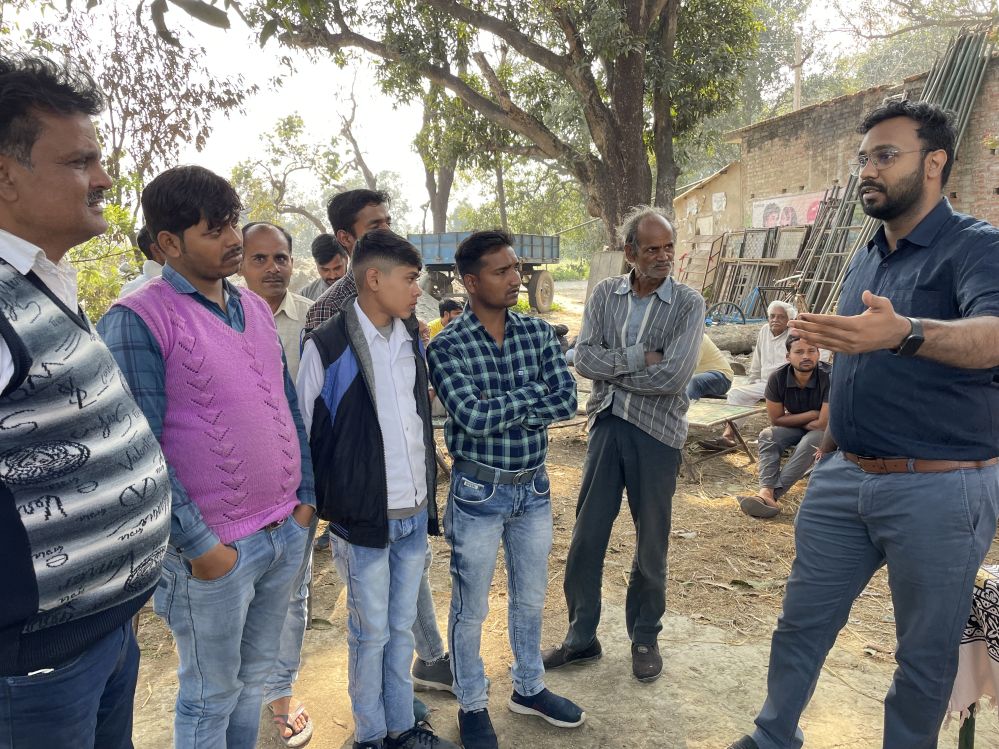After a fun—but ultimately not very lucrative—few years working on driverless cars, a pandemic-induced lull prompted engineer and tech fan Kumar Ranjan to use his talents in a very different industry: farming.
And two things immediately struck him, says Ranjan, who cofounded precision livestock farming startup eFeed with Ravi Chauhan and Ankit Patel in 2021. One: smartphone use in rural India had grown dramatically; and two: the economy was moving from cash to mobile phones.
Both helped lay the groundwork for a business pulling data from thousands of small farmers to drive a recommendation engine designed to help them improve milk yields and quality and reduce methane emissions.
AgFunderNews (AFN) caught up with Ranjan (KR) to get the lowdown on eFeed, part of the fifth cohort of the AgFunder GROW Impact Accelerator [Disclosure: AgFunder is AgFunderNews’ parent company].
AgFunderNews (AFN): What’s your background?
KR: I’m kind of an accidental entrepreneur. I was always into cars, Formula One and NASCAR, and researching things like how we can innovate in materials to improve safety. But the pivotal moment came for me in 2014 when [Indian automotive company] Mahindra started an event called Spark the Rise, which would award a million dollars to a team in India that could come up with an autonomous or driverless car.
So I started work on that in the third year of my engineering degree, and it was my first experience of trying to raise money, and I got negative responses on almost every call.
Venture capital is new in India, and after a while it became clear that this wasn’t going to work because no one will use autonomous cars here [in India]. It just never really flew as a startup, although it was a great learning experience because I had to build a team and run a project.
However, at a certain point I sat down and said I will not do this anymore. I need to take a step back and figure out a career and a way to make money.
So I went to work in a corporate, which was also a great learning experience, but after a year I quit my job and got back into the [entrepreneurial] ecosystem and started working on couple of ideas while also consulting with some companies based on my experience with autonomous technology. And then the pandemic hit and suddenly everything stopped.
AFN: What’s the origins story of eFeed?
KR: I come from a very small place called Lucknow in Uttar Pradesh that’s famous for kebabs. And because of the supply chain disruption in pandemic, I met a lot of dairy and meat producers who were facing difficulties and I saw an opportunity present itself.
What was funny was that I spent years trying to raise venture capital for autonomous vehicles and could not get a single check, and the moment I got in the agriculture industry, I was able to raise half a million dollars [in 2021] in seed funding!
One thing from the very beginning that was clear to us is that we had to build a technology company, because most of the companies in India operating in agri are generating revenues through trading commodities in bulk. I had also observed two very interesting signals in the market: the use of smartphones in rural India had grown really dramatically and the economy was moving from cash to mobile phones.
10 years back if I was doing agri tech startup, I would have had a lot of challenges in reaching farmers. But today, just using my smartphone, I can reach them really easily.
AFN: How did you meet your cofounders Ankit Patel and Ravi Chauhan?
KR: We all worked together in the automotive field. I used to visit universities to give talks on entrepreneurship and Ravi pitched an idea to me, and was looking for a mentor, and we got to know and trust each other.
Ankit was from IIT [Indian Institute of Technology] Bombay and had had a good startup experience working at a unicorn company [B2B e-commerce platform Udaan], and we had an instant connection. He also grew up around farming and he has seen the problems firsthand.
AFN: What was your initial focus at eFeed?
KR: The first thing we built was a precision nutrition advisory platform, an app for dairy farmers that was collecting their data. So for example, we asked for information from farmers on animal breeds, feeding regimens, and milking data. And based on that, we gave highly localized recommendations on diet [to optimize milking and reduce methane emissions]. Because many farmers are not very educated, we also used a lot of pictures, so for example they can choose the breed of the animal they rear by selecting from a series of pictures or receive audio recommendations in multiple languages.
For the last 2+ years we have been collecting data, and in our lab in Pune, we create a digital repository of all the grains, green fodder, dry fodder that the Indian ecosystem has, and then benchmark the raw materials against the ideal protein and fat and fiber content farmer need to produce milk or meat that will generate the most revenue.
Let’s say a farmer inputs maize, Napier grass, and millet at various quantities. Based on all the data we’ve collected and analyzed, we can show that he needs to increase the protein or the fat or lower the fiber in his cows’ diet.
Then we ask what problems farmers want to address or prioritize, such as poor productivity, poor milk quality, timely heat, or pregnancy status. These are the four major things which drive the profitability of the farmers.
At this stage, we simply ask them, What problem do you want to focus on? Let’s say they want to increase fat in the milk. We can then provide dietary recommendations based on what feed is available locally, so change the ratio of Napier grass to millet for example; we also have a marketplace for high-quality nutrition products.
It’s too expensive to provide them with completely personalized or customized feed, but we can provide localized recommendations.
AFN: Are you providing recommendations or/and products? How do you make money?
KR: As a startup in this market, you will not make money from just giving advice. The only way for us to make money was to get products in the market meant for that particular animal type or breed based on all the data we had accumulated.
As of today in the areas we’re operating, our products are performing really well. The biggest success metric for us was in all the villages where we are currently operating, the milk they supply to collection centers has an improvement in both volumes and fat levels.
So selling animal feed supplements doesn’t make us a tech company, but in the current financial climate, where companies are going under every week, you need something that is going to generate cashflow while you work on other parts of your business. We have to survive above all. Had we stuck to [the company’s initial mantra that] ‘We will only make money from tech,’ we would be dead by now.

AFN: What’s next?
KR: The pivot happened a few months back. The data eFeed collected from 300,000 farmers and all the animals became very useful in tackling greenhouse gas emissions, particularly methane. So we went to large agencies working in sustainability and carbon credits and said what do you need to measure emissions?
They said we’d need to collect data from farm animals, their feeding regimens and so on, and then we told them that we already had that information, and we realized that we have the capability to build something for the industry around sustainability, not just productivity and quality.
Currently, we are in process of onboarding some large companies in the US and New Zealand [interested in using eFeed’s platform to measure methane emissions] after partnering with satellite companies. On our platform there’s a low orbit satellite feature where you can base map your farm and calculate methane emissions. So I can zoom into a particular location, where the satellite has collected data on carbon dioxide, methane, and nitrogen dioxide.
And depending on the density of the gas, the satellite can tell you how much of the gas is present in the region. Our proprietary algorithms also factor in the impact of wind and climate on methane emissions from a region so farms don’t get penalized for emissions they haven’t generated.
AFN: Is this a validated standard way to measure methane emissions in agriculture?
KR: Not right now, but this is one of the ways to verify emissions. It’s a first data point to give you an approximate value. Then on top of the satellite data we layer on our data about what breeds farmers have and what the animals are eating, and then we can tell you approximately what emissions they are producing in a given area.
With most of the companies in the US and Europe we are working with, we can simply import the data of what they’re feeding, how much milk they are producing, and calculate methane production. If a satellite says the emissions from this area are this amount, we can then look at the animal data and say how much is likely coming from livestock.
One of the biggest problems when it comes to greenhouse gas emissions is that there’s a lack of transparency. We have a system which is transparent. We have collected data from more than 200,000 animals. We’re still building a couple of modules on carbon accounting and measuring, but VC funds are actually approaching us now, although they all want to see some more validation. Carbon registries like Verra and International Carbon Registry are actively looking for new methodologies for accurate emissions measurement and we want to pioneer them.
AFN: Where does AI come in?
KR: eFeed is trying to develop a model which can simulate the cattle rumen and we’re looking to partner with a company that is working in microbiomes to help us understand cattle better. I can then digitize the entire cattle rumen in software that any scientist can use. But all this work in the backend is done by AI.
AFN: What else are you working on?
KR: After inseminating cattle, farmers have no idea if the animal is pregnant or not, so they have to call a doctor. This project is in the R&D phase, but we found that in cow urine and saliva, there’s a particular molecule which is present when the animal gets pregnant. So we have a small sensor which can go into a mobile phone as a cost effective solution to detect pregnancy.
AFN: If you could start over, what would you do differently?
KR: If I go back and look at our journey, I don’t regret any decisions. India is a tough place to innovate. We have the talent but we don’t have the same exposure to the top tech community and customers that pay for innovation.
The reason we’re talking to potential partners for our methane accounting system in the US, New Zealand, Greece and so on is that they pay for innovation. If I asked a dairy company in India, it would be a case of hey, we’ll talk about it later. In the UK and the US, they say, let’s talk about it now.
Further reading:
Bluemethane unveils novel tech to capture methane from water





